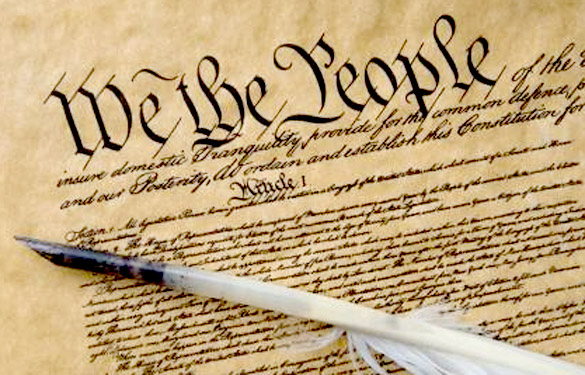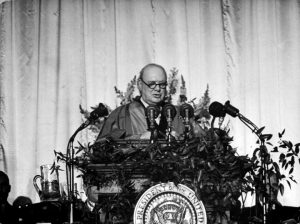Every year there are dozens of scholarly books and articles that are published describing the founding period of the United States. The debate between Federalists and Anti-Federalists over the ratification of the Constitution is one of the topics often discussed. Both the Federalists and the Anti-Federalists presented arguments that have had profound effects on subsequent American history. It is important for us to learn the full nature of their debate and how it has influenced our views on American government.

“Nothing is more certain than the indispensable necessity of government, and it is equally undeniable, that whenever and however it is instituted, the people must cede to it some of their natural rights in order to vest it with requisite powers.”1 Federalists, the supporters of the Constitution, had the support of some of the most prominent men in America, including Benjamin Franklin and George Washington. Moreover, prominent political philosophers of their time, such as Alexander Hamilton, James Madison, and John Jay, published a series of essays under a pseudonym “Publius.” These essays were widely published in newspapers throughout the nation. They explained the meaning and the virtues of the Constitution and countered the powerful arguments of the opposing side. Today, they are known as The Federalist Papers. These documents are important American contributions to modern political theory.2

Patrick Henry, a famous Anti-Federalist, was well known for his quote, “I know not what others may choose but, as for me, give me liberty or give me death!” In order to combat the attention given to those who had different opinions, the Federalists deemed their opponents as “Anti-federalists,” giving the message that individuals that were not associated with the Federalists had nothing to offer besides negative opposition and chaos. However, Anti-Federalists did have serious and intelligent arguments of their own. They presented themselves as the loyal defenders of the principles of the Revolution. Moreover, they believed that the Constitution would betray the principles of freedom by establishing a tyrannical central power in the new government.
The main claims of Anti-Federalists were that a federal government would make unfair distinction among the citizens, raise taxes, abolish the states, and end individual liberties.3 According to them “the constitution was the basic mistrust of human nature and the capacity of human beings to wield power.”4. They believed the Constitution lacked a much needed Bill of Rights, a concern that became one of the most important sources of their opposition, with at least nine out of ten Anti-Federalists wanting a written Bill of Rights.5

At the heart of the debate between Federalists and Anti-Federalists was a battle between two fears. The Federalists were afraid of disorder, anarchy, and chaos; they believed that a constitution would prevent these catastrophic events. The Anti-Federalists were not anarchists and they too recognized the need for an effective government; they believed that the greatest threat to the future of the United States was the government’s potential to become corrupt and seize more power until its tyrannical hand stretched across the country and completely dominated the citizens.6
Despite the Anti-Federalist efforts, the Constitution was ratified in 1790, but during the ratification debate, Madison conceded that a bill of rights was needed. Federalists assured that the first step of the new government would be adopting a bill of rights.
- John Jay, Federalist Papers no 2, (1787), 1. ↵
- Alan Brinkley, American History: Connecting with the Past Volume 2, 15 edition (New York: McGraw-Hill Education, 2014), 145. ↵
- Alan Brinkley, American History: Connecting with the Past Volume 2, 15 edition (New York: McGraw-Hill Education, 2014), 146. ↵
- Alan Brinkley, American History: Connecting with the Past Volume 2, 15 edition (New York: McGraw-Hill Education, 2014), 146 ↵
- Main T. Jackson, The Antifederalists: Critics of the Constitution, 1781-1788 (New York: W.W. Norton, 1974), 159. ↵
- John H. Aldric and Ruth W. Grant, “The Antifederalists, the First Congress, and the First Parties,” The Journal of Politics, vol 55 no. 2 (1993): 295. ↵



71 comments
Yahaira Martinez
i really loved this article just because i had learned about this topic a while back ago, and know that i re-read it , it have such a different and clearer understanding of what the whole situation was about and comparing their views now with a more developed sense of understanding. this article was very well written and the comparisons were made very well.
Nathan Hudson
I knew of the quarrel between the Federalists and the Anti-Federalists and I enjoyed this good recall. It is so important to show each side of arguments because most of the time, each side has very intellectual points. I enjoyed this article because it felt very unbiased, and when people usually write about the government or things that concern it, they usually implant their opinions in, which removes their credibility.
Oceane Roux
Thank you for this well-written article! I always enjoy learning about the American history. I think it is extremely interesting to see how these men wrote the federalist papers to defend the Constitution. Politics is extremely complex, and it is crazy to see that these men are starting it from zero and that their ideas written in the Constitution are now the base of the American government.
Osman Rodriguez
Great article! I enjoy reading about American history. The end of the article, personally, shows how government should work. There should be compromise and collaboration. Because this was possible, we are now the best country in the world. I know some people tend to disagree and hate certain aspects of the country, but they don’t seem to understand that they live in the best time and place. In other countries, simple expressing certain views, could have you killed.
Sam Vandenbrink
The article was interesting but I personally felt like it took a long time to get to actually talking about the federalist and Ant-Federalists. Its interesting how the Federalist were scared of anarchy and how the Ant- Federalist were just laid back and said that the constitution was going to do its job. Good article, felt that it went all over the place during the read though.
Johnanthony Hernandez
Well written, it’s interesting to see similarities between the anti-federalist and the federalist and political parties now. Like in recent history both sides have legitimate fears about what will come from the opposing sides views. Yes, it end in somewhat of a compromise with the Constitution being ratified as well as the Bill of Rights being added. I think we can look to the issues between the anti-federalists and the federalist to better understand current.
Nicolas McKay
This was an extremely well written article. You took a very complicated subject and simplified it into an understandable and very enjoyable read. You can certainly see the merit in arguments from both sides. Who could blame the anti federalists for feeling the way they did after having fought the revolution. Its amazing to see the story leading up to the birth of our nation.
Teresa Valdez
It is strange to think that once independence was achieved, the leader of the time went from working together for freedom to political rivals. It was clever of the Federalist to dub their opponents “Anti-federalists” simply for the negative connotation. I like that this article voiced the motivations of both groups equally. Their differing goals were clear, making the conflict more understandable. Great job!
Cameron Adelman
I definitely liked this article, but I feel that it could have benefited from a clearer and more upfront definition of what constitutes “Federalism” and “Anti-Federalism.” You do indirectly define what both of these groups believe in toward the second half of the article, but I feel that your readers would definitely benefit it you gave a more straightforward description of both groups from the outset. Other then that, the article was otherwise very well written. Good job.
Oscar Portillo
I liked this article it was written in a clear and concise way so that anyone such as a middle school or high school student could easily understand and get a feel for both the Federalist and anti-Federalist party. The concerns of the anti-Federalist party are timeless concerns that even to this day we still debate about. We can clearly see that with all the upheaval we see with groups such as Black Lives Matter and many more. Good article!